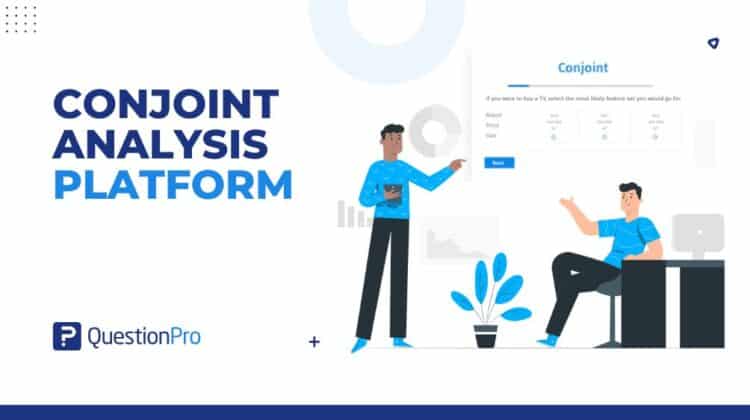
If you’ve ever wondered why some products capture customer attention while others don’t, it often comes down to understanding real preferences. People don’t make choices based on a single factor; they weigh features, price, quality, and design before deciding. Using the Best Conjoint Analysis Platforms, you can uncover these hidden priorities and see what really drives decisions.
Instead of just asking customers what they like, these platforms let you present them with realistic product or service options and observe their choices. This approach shows you the trade-offs people are willing to make and which features matter most. With this insight, you can design better products, create smarter pricing strategies, and improve overall customer satisfaction.
In this blog, we’ll explore the 10 Best Conjoint Analysis Platforms in 2025 so you can find the right tool to understand your customers, test ideas, and make informed business decisions.
What is Conjoint Analysis?
Conjoint analysis is a powerful market research technique that helps you understand how people make choices between different products or services. Instead of asking customers directly what they like, it presents them with sets of options that combine different essential features such as price, quality, size, or design, and asks them to pick the one they prefer.
By studying these choices, conjoint analysis reveals the hidden priorities behind customer decisions. It shows which features matter the most, how much value people place on them, and what trade-offs they’re willing to make. For example, you can learn if your customers care more about paying a lower price or getting a premium feature.
Conjoint analysis moves beyond surface-level opinions. It digs deeper into real decision-making behavior, giving businesses insights they can use to design better products, create smarter pricing strategies, and improve customer satisfaction.
10 Best Conjoint Analysis Platforms
If you’re exploring conjoint analysis and looking for the best platforms to help you understand customer preferences, here’s a list of the top 10 tools in 2025. Whether you’re a startup, researcher, or enterprise, there’s a solution customized for your needs.
1. QuestionPro
QuestionPro is a versatile and user-friendly platform that allows you to run conjoint analysis easily within broader survey research projects. Whether you’re testing product features, pricing options, or customer preferences, QuestionPro provides everything you need to gather actionable insights in one place.
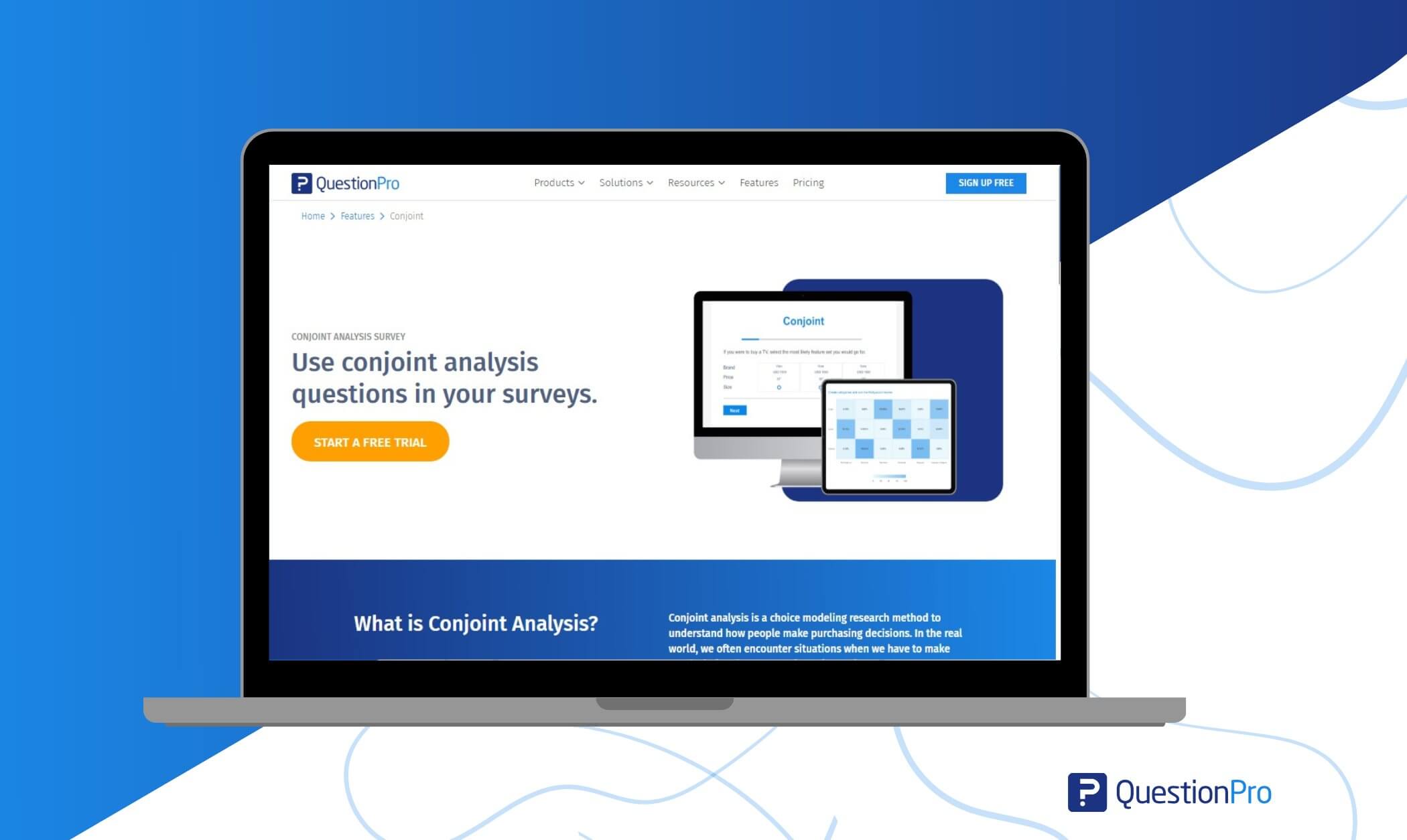
Key Features:
- Conjoint analysis tool
- Custom experiments with multiple attributes
- Randomized, balanced designs
- Adaptive conjoint features
- Branded surveys with skip logic
- Multi-channel data collection
- Tool integrations
- Advanced analytics & simulations
- Visual reports & charts
- Support & training
Cons:
- Advanced features may require more effort and resources to be effectively used.
Pricing:
- Pricing starts from $99.
2. SurveyMonkey
SurveyMonkey is a popular survey platform that offers conjoint analysis through its specialized researcher-managed service. It’s ideal if you want to combine general survey capabilities with conjoint studies, though building conjoint surveys directly in the platform is limited.
Key Features:
- Customizable conjoint surveys
- Multi-channel distribution
- Analytical tools for insights
- Platform integrations
- Team collaboration support
Cons:
- You can’t build your own conjoint in the platform directly.
- You must pay extra for each conjoint project.
Pricing:
- Pricing starts at $25 monthly.
3. 1000minds
1000minds is a specialized platform designed for decision-making and conjoint analysis. It offers both pairwise (PAPRIKA) and discrete choice tools, making it ideal for researchers who want clear insights into customer priorities and trade-offs.
Key Features:
- Decision-Making Capabilities.
- Prioritization Tools.
- Value for Money Analysis.
- Conjoint Analysis Functionality.
- Group Decision-Making Support.
Cons:
- Pricing is unclear and potentially expensive.
Pricing:
- Pricing available upon request.
4. Qualtrics
Qualtrics is a powerful experience management platform that makes running conjoint analysis simple, even if you don’t have a background in statistics or economics. With its intuitive wizard, you can set up experiments quickly and get actionable insights.
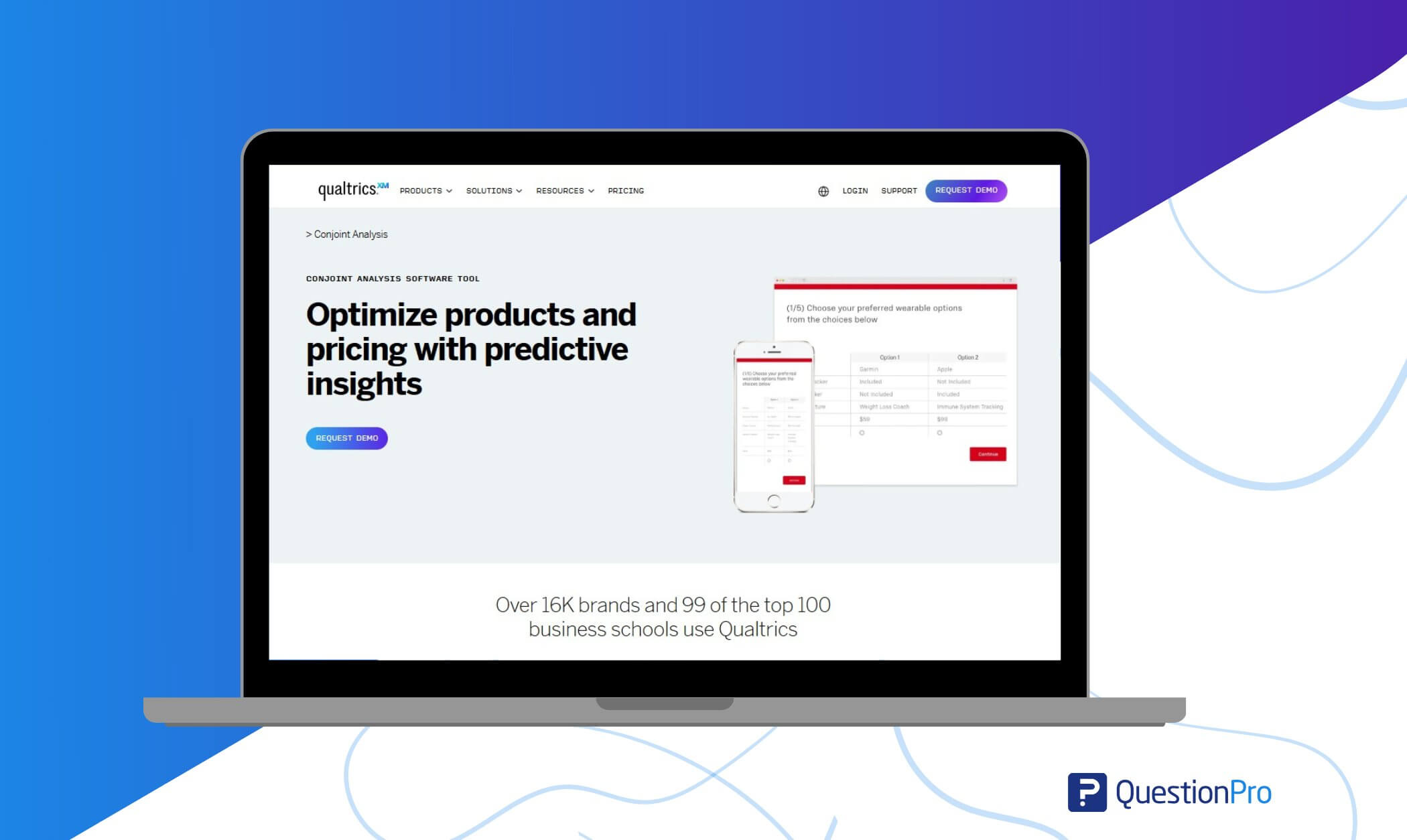
Key Features:
- Wizard-based conjoint setup
- Automatic product/pricing optimization
- Visual and market simulators
- Image-based attribute support
- Segmentation analysis
- Real-time analytics
- Conditional pricing fields
- No stats degree required
- Smooth integration with CX data
- Enterprise-level support
Cons:
- Overkill for simple experiments.
Pricing:
- Pricing available upon request.
5. Lighthouse Studio
Lighthouse Studio by Sawtooth Software is a heavyweight, research-grade tool for serious conjoint analysis. It’s perfect for researchers who want total control over experimental design, from basic CBC (Choice-Based Conjoint) to advanced modeling like ACA and MaxDiff.
Key Features:
- General computer interviewing
- Choice-based conjoint (CBC)
- Conjoint value analysis
- Data piping
- Randomization of blocks, pages, questions, responses
- Quota control
- Foreign language support
Cons:
- Significant learning curve.
Pricing:
- Pricing available upon request.
6. Alchemer
Alchemer is a flexible survey platform that also supports choice-based conjoint analysis in its higher-tier plans. It’s a great option if you want a combination of general survey capabilities and conjoint research in one tool.
Key Features:
- CBC conjoint analysis
- Intuitive survey design
- Customizable surveys & experiments
- Analytical insights
- Team collaboration features
Cons:
- Conjoint is only available in the top tier.
- Higher user cost with advanced needs.
Pricing:
- Pricing available upon request.
7. Conjoint.ly
Conjoint.ly is a dedicated online platform built specifically for conjoint analysis. It provides guided survey creation, advanced reporting, and market simulations, making it easy for you to uncover true customer preferences.
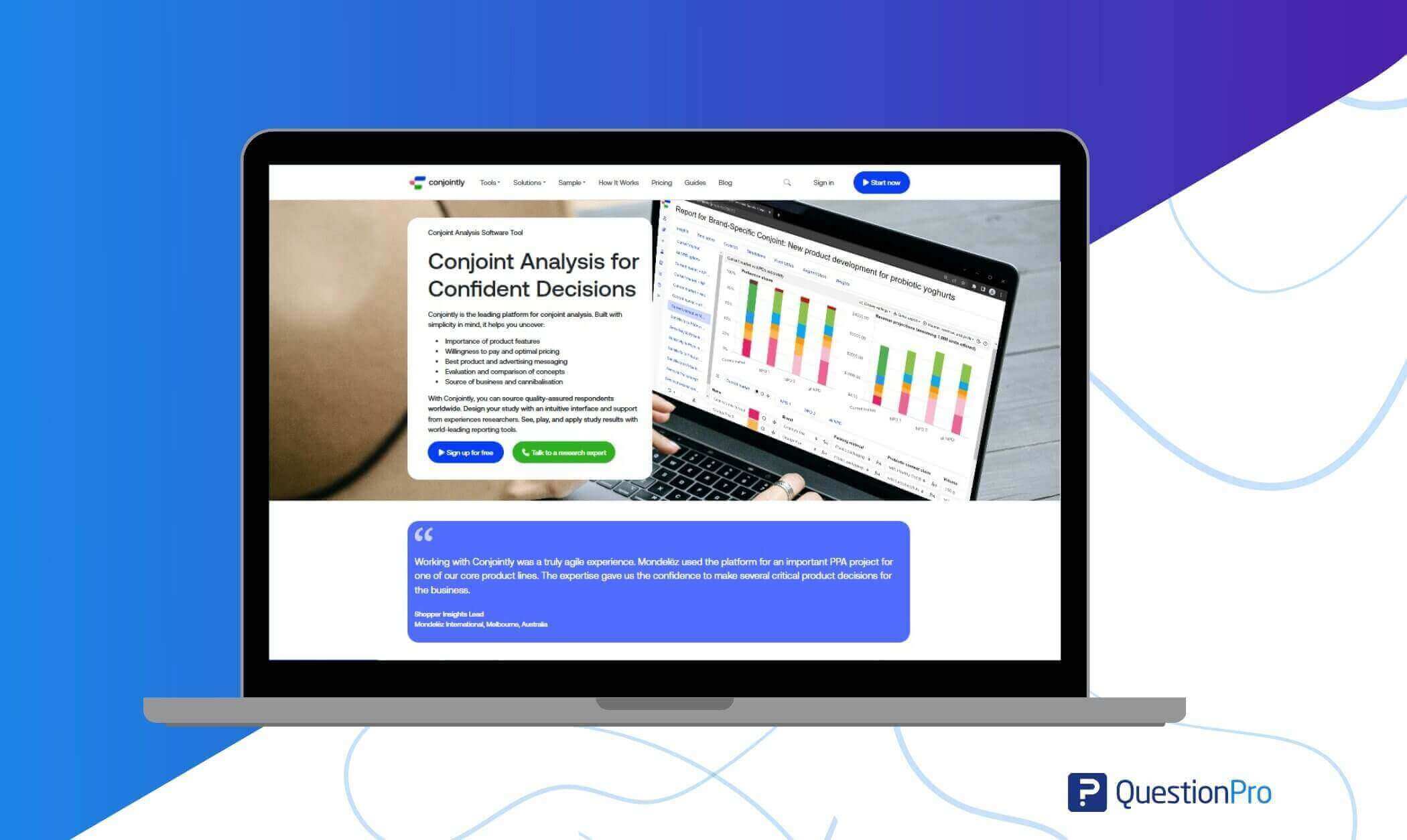
Key Features:
- Advanced conjoint settings
- Automated participant management
- Sample size & reminders
- Export to PowerPoint/Excel
- Survey customization
- Profiling & redirects
- Survey logic
- Mobile-ready templates
Cons:
- Higher user cost with advanced needs.
Pricing:
- Pricing available upon request.
8. OpinionX
A refreshingly free conjoint tool letting you run unlimited surveys with rich analysis and CRM enrichment, great for cost-conscious users.
Key Features:
- Unlimited free conjoint surveys and participants
- Real-time ML-based scoring
- Market scenario simulation & WTP
- Prohibited pairs logic
- Easy embedding within broader surveys
- Filters and segmentation
- Clean visual reports
Cons:
- No built-in respondent panel.
- Limited branding.
Pricing:
- Premium pricing starts at $300 yearly.
9. SPSS
SPSS is a robust statistical software widely used for market research and advanced analytics, including conjoint analysis. It’s ideal if you want to perform detailed statistical modeling and analyze customer choice data with precision.
Key Features:
- Choice-Based Conjoint (CBC) and Traditional Conjoint modules
- Advanced statistical modeling and regression analysis
- Automated reporting and export options
- Multi-language and multi-region support
Cons:
- Requires statistical knowledge to use effectively
Pricing:
- Pricing available upon request.
10. Pollfish
Pollfish is a fast-response survey platform with built-in support for choice-based conjoint analysis and MaxDiff. Its global respondent network allows you to quickly gather insights from a wide audience, making it ideal for market research investment that requires speed and reach.
Key Features:
- Built-in choice-based conjoint & MaxDiff
- Access to a wide panel (Prodege network)
- Pay-per-response transparency
- Advanced filters for targeting
- Brand-themed dashboards
- Strong support and account guidance
Cons:
- Less control over sample composition.
- Limited deep analytical tools.
Pricing:
- Pricing available upon request.
Comparison Table to Help You Choose the Right One
Choosing the right conjoint analysis platform can feel overwhelming with so many options available. That’s why a clear comparison table helps you see the differences at a glance. By looking at features, pricing, and user ratings, you can quickly identify which platform fits your business needs, research style, and budget.
Here’s a simple comparison of the 10 best conjoint analysis platforms to help you make an informed choice:
| Platform | Key Features | G2 Rating | Pricing |
| QuestionPro | Custom experiments, adaptive conjoint analysis, multi-channel data, analytics & reports | 4.5 | Pricing starts from $99 |
| SurveyMonkey | Customizable surveys, multi-channel distribution, analytics, and team collaboration | 4.4 | Pricing starts at $25 monthly |
| 1000minds | Decision-making, prioritization, pairwise/PAPRIKA, group decision support | 4.9 | Custom pricing |
| Qualtrics | Wizard-based setup, visual simulators, segmentation, conditional pricing, analytics | 4.3 | Custom pricing |
| Lighthouse Studio | CBC, ACA, MaxDiff, data piping, randomization, quota control, foreign language support | 4.0 | Custom pricing |
| Alchemer | CBC conjoint, intuitive survey design, analytics, and team collaboration | 4.4 | Custom pricing |
| Conjoint.ly | Advanced conjoint settings, automated participant management, simulations, and exports | 4.5 (As per Capterra) | Custom pricing |
| OpinionX | Unlimited surveys, ML-based scoring, market simulation, filters, segmentation | 4.5 | Pricing starts at $300 yearly |
| SPSS | CBC & traditional conjoint, advanced statistical modeling, segmentation, market simulation | 4.2 | Custom pricing |
| Pollfish | Built-in CBC & MaxDiff, global panel, pay-per-response, filters, dashboards | 4.5 | Custom pricing |
Importance of Conjoint Analysis Platforms for Market Research
Using conjoint analysis platforms can make a huge difference in understanding your customers. Instead of guessing what people want, these tools help you see what really drives their decisions. You can test different features, bundles, and pricing in a way that reflects real-world choices.
Here’s why they are so important:
Understand True Preferences: Conjoint analysis platforms allow you to dig deeper into customer decision-making. You’ll be able to identify which product features, combinations, or pricing options influence choices the most, rather than relying solely on what customers say they like.
Design Better Products: With insights from these platforms, you can create products or services that genuinely meet customer needs. By knowing which attributes matter most, you can focus your resources on developing offerings that are more likely to succeed in the market.
Set the Right Price: Pricing is tricky, but conjoint platforms help you understand how much customers are willing to pay for specific features. This helps you avoid overpricing, which could drive customers away, or underpricing, which could leave money on the table.
Test Market Scenarios: These tools let you simulate different scenarios, such as:
- Varying feature combinations or
- Pricing strategies
By predicting how customers might respond, you can make informed decisions and reduce the risk of product launch failures.
Target the Right Customers: Not all customers are the same. Conjoint analysis helps you identify distinct segments based on their preferences. This means:
- You can craft more personalized marketing campaigns and
- Better allocate resources to reach the customers who matter most
Why QuestionPro is the Right Choice for Conjoint Analysis?
When it comes to understanding what your customers really want, QuestionPro makes the whole process simple and effective. It’s built to help you run conjoint analysis without the headache, so you can focus on insights instead of figuring out complicated software. Here’s why it stands out:
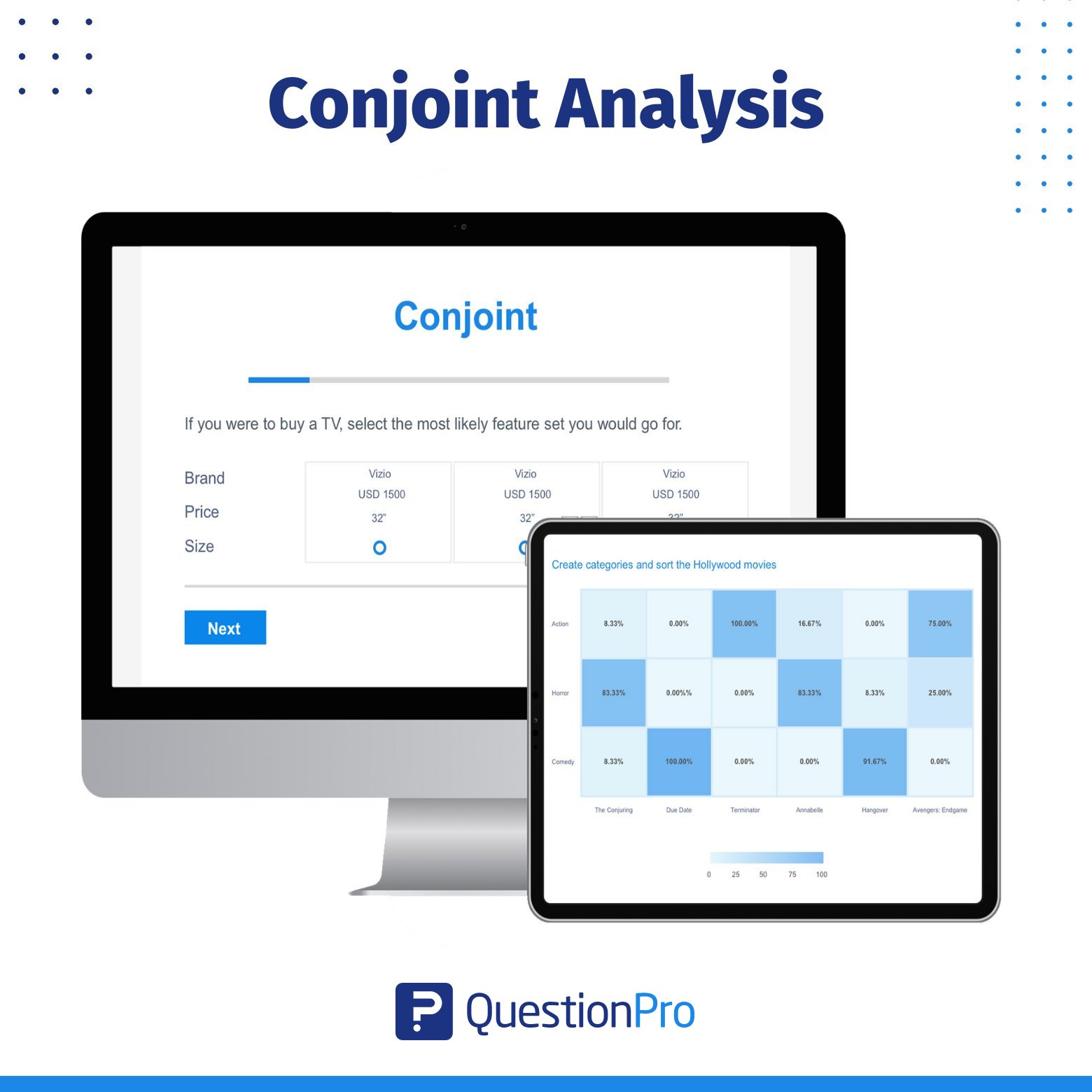
- Powerful Conjoint Features: Setting up and running experiments is a breeze. You can test different features, pricing options, and product combinations to see what truly matters to your audience.
- Smart Analytics & Reporting: After collecting responses, QuestionPro turns your data into actionable insights. From preference shares to market simulations, you’ll get a clear picture of customer priorities.
- Flexible Survey Customization: Make your conjoint analysis surveys look and feel the way you want. Add branding, skip logic, or branching to keep respondents engaged and gather high-quality data.
- Easy Integration & Teamwork: Sharing data and collaborating are simple. QuestionPro works well with other tools and helps your team stay aligned, whether you’re in-house or working with external partners.
- Affordable & Versatile: You get advanced features without overspending. Additionally, QuestionPro isn’t just for conjoint analysis; you can use it for customer feedback, market research, employee surveys, and more.
With QuestionPro, you get a user-friendly, versatile platform that helps you uncover real customer insights and make smarter decisions for your business.
Conclusion
Choosing the right tool for conjoint analysis can make a big difference in understanding your customers and making informed business decisions. The 10 Best Conjoint Analysis Platforms we’ve covered offer a variety of features, pricing options, and analytics capabilities, whether you’re a startup, researcher, or enterprise.
By using these platforms, you can uncover what truly matters to your audience, design products that meet real needs, and set prices that resonate with customers. Among them, QuestionPro stands out for its powerful features, ease of use, and versatility across different types of surveys.
Investing in a reliable conjoint analysis software means you’re not just guessing what your customers want; you’re making data-driven decisions that can help your business grow smarter and faster.
Frequently Asked Questions (FAQs)
Answer: Conjoint analysis is a market research technique that helps you understand how customers make choices between products or services. It reveals which features, price points, or combinations matter most, helping businesses design better products and pricing strategies.
Answer: Some of the top platforms include QuestionPro, SurveyMonkey, 1000minds, Qualtrics, Lighthouse Studio, Alchemer, Conjoint.ly, OpinionX, Sawtooth Software, and Pollfish. Each offers unique features for designing surveys, analyzing data, and gaining actionable insights.
Answer: Yes! Many platforms, like QuestionPro and OpinionX, offer affordable plans or even free options suitable for startups and small businesses to run effective conjoint analysis studies.
Answer: Yes. Most platforms allow integration with analytics tools, CRMs, or data visualization software, making it easier to collaborate and analyze data across your team.
Answer: Consider your budget, the complexity of the studies you want to run, team collaboration needs, and the type of insights you require.







